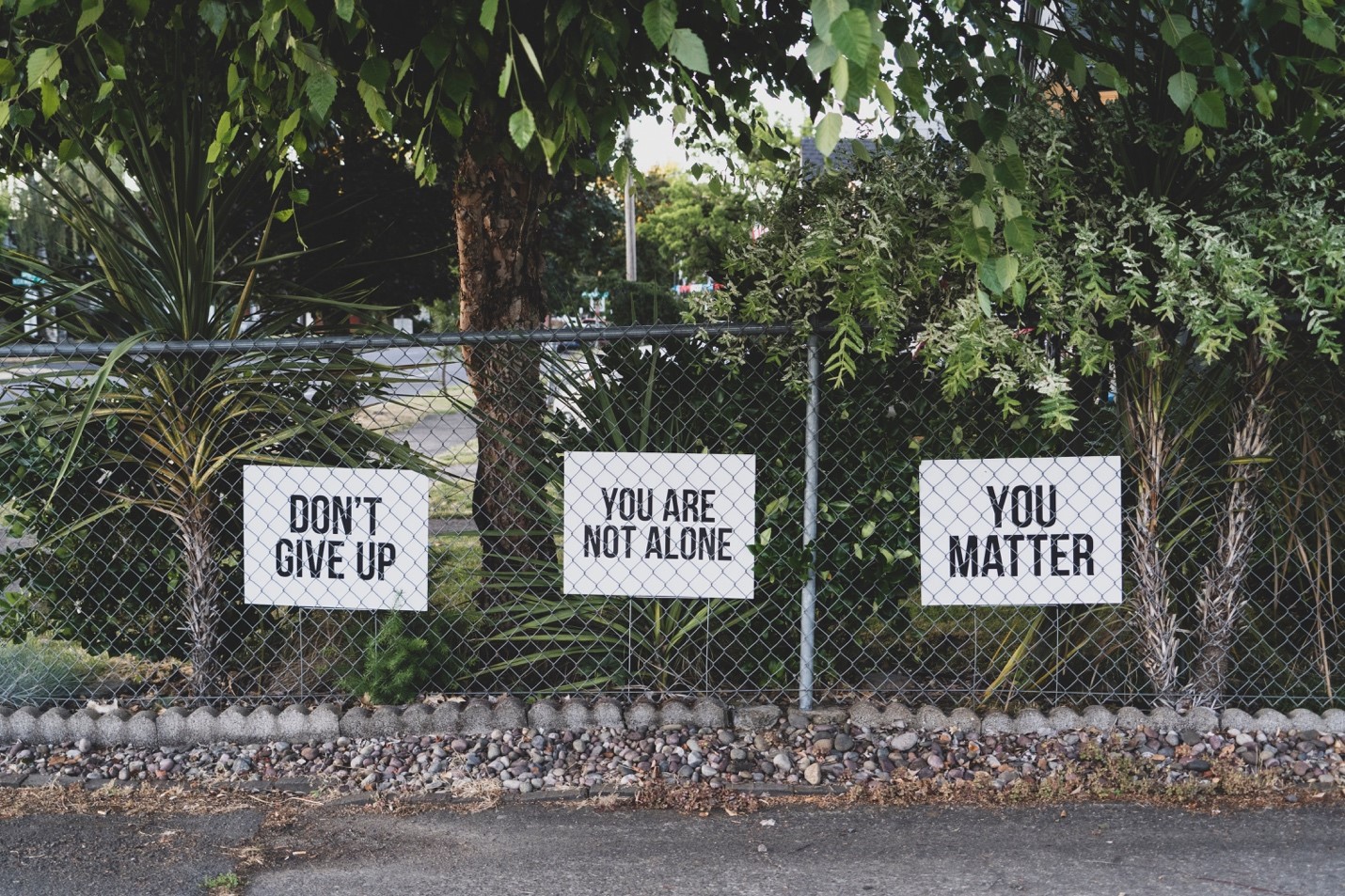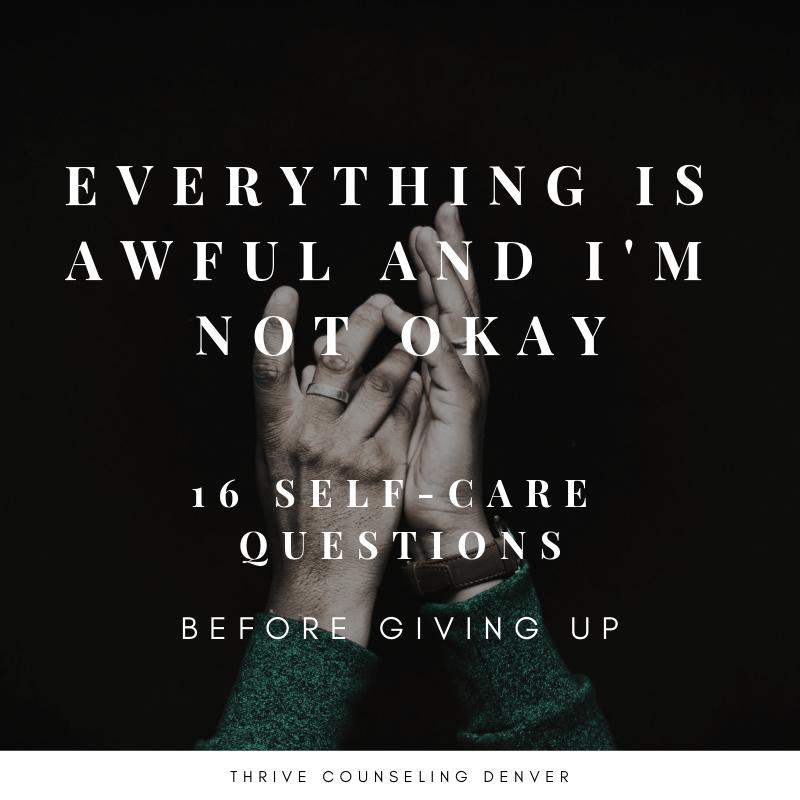
Not Feeling Thankful this Season? Explore These Three Things
Not feeling thankful this holiday season? That’s okay. Here’s how to accept those feelings in a way that is helpful rather than harmful.

Not feeling thankful this holiday season? That’s okay. Here’s how to accept those feelings in a way that is helpful rather than harmful.

Amelia Elkins, LCSW, CAS While it is completely normal to have thoughts of hopelessness from time to time, suicidal thoughts should be taken seriously and deserve attention. Today, suicide is still more prevalent among males, however, females are more likely to attempt suicide. For folks under the age of 24 years old, suicide is the third leading cause of death, and second leading cause for the specific age group of 10-14 years old. American Indian and Alaska Native individuals are at the greatest risk for suicide, with non-Hispanic white folks coming in as the second most at risk group. There are so many pressures for today’s younger generations including appearance, grades, friendships, social media, and constant screen time. Constant comparison and accessibility leads to extra stress for teenagers, which could lead to suicidal ideation if one is already not feeling mentally stable. If you or someone you know seems to be struggling, connect with them and don’t ignore the signs. Here is a list of resources for support: Colorado: Colorado Crisis Services is a 24/7 hotline for support. They also offer walk in centers around Denver to be seen day of: https://coloradocrisisservices.org. Pikes Peak Suicide Prevention in Colorado Springs offers individual therapy, group therapy and other resources: https://www.pikespeaksuicideprevention.org. Denver Indian Family Resource Center offers support for American Indian and Alaska Native Families: https://difrc.org. The Asian Pacific Development Center offers a wide range of mental health services for Asian American Pacific Islanders: https://www.apdc.org/about-us. El Centro de las Familias is a multicultural clinic providing mental health services in both Spanish and English: https://www.wellpower.org/el-centro-de-las-familias-english/. National: 988 Suicide Line offers resources and a hotline: https://988lifeline.org Crisis Text Line offers a 24/7 text hotline: https://www.crisistextline.org The Trevor Project offers a variety of resources for LGBTQ folks: https://www.thetrevorproject.org Starting therapy and having regular support may be beneficial in reducing suicidal ideation. Reach out today to get support.

Amelia Elkins, LCSW, CAS Winter is coming! ‘Tis the season for colder temperatures, post-holiday blues, and gray skies. For some, this may mean stress or anxiety about the potential onset of SAD (seasonal affective disorder). The seasons simply changing may start to trigger symptoms of depression, such as: low energy, exhaustion, and lack of motivation. Risk factors for developing SAD include living in an area with less daylight during the winter, having a Bipolar diagnosis, or a family history of SAD. If you’re concerned about developing SAD, are in a current phase of SAD, or know someone struggling, check out these tools for support: >Let there be light: Purchasing a light box and sitting in front of one for a set amount of time each day has been proven to be an effective treatment. Also, making daylight a daily priority by going for a walk may be helpful. If traveling is an option, making a point of traveling somewhere sunny and warm in the middle of winter is also a great tool for mixing up a challenging season. >Self-Care Routine: Making healthy eating, daily exercise, consistent sleep patterns, and water intake a priority cannot be underestimated. Self-care may also include getting rid of negative influences, taking space from people who aren’t making you feel like your best self, and focusing on activities that create joy. >Consult your Doctor: Having a doctor check in on your Vitamin D intake, run a physical, and check your thyroid may also be helpful in addressing and reducing symptoms. >Reset your Space: If you must be inside due to the weather, how do you feel about your space? Taking time to clean, organize, and get rid of items which aren’t contributing to feelings of wellbeing may be helpful. The Dutch art of Hygge can be practiced year round, but may be especially helpful during the winter months. This includes creating lots of indoor light, comforting music, comforting food, and yummy smells.

Amelia Elkins, LCSW, CAS “We are not working from home. We are working with home” -Esther Perel Why is Working From Home Taking a Toll? With all the changes over the past two years, working remotely has become much more popular. There are so many advantages to working from home including the flexibility to travel, attend appointments, and take care of household items. Even the stress of a daily commute is eliminated. However, with these benefits comes unexpected setbacks. Just to name a few: not being able to separate from work, working more than you would in an office, and feeling isolated. And we know what feeling isolated from others can lead to–depression. I recently had a client disclose that she feels she gets the most support and connection out of her day from going to a workout class. Not from her work colleagues, with whom she spends most of her day. Just as we value relationships with the people in our life, our work relationship should be given the same attention. How to Cope if Working From Home is Negatively Impacting Your Mental Health If you feel that working from home these last few years has been taking a toll on you, here are some tips to improve your relationship with work: Create Separation. This seems to be one of the most helpful tools for folks working from home. Having a separate space. Even if it’s a tiny desk in front of a window where you’re able to work daily; this can help the ritual of easing in and out of work to feel more manageable. Easing into your day by having a warm beverage and closing the day by shutting down your laptop or even cleaning your space can feel like a “mini commute.” While it can be tempting to work in pajamas from the couch, getting somewhat ready or cleaned up in the mornings followed by working at the same space can help reduce stress and create distance between home and work. More on this here: https://www.inc.com/marcel-schwantes/5-remote-work-practices-for-better-work-life-balance.html. Take Breaks. Research states taking breaks every 60-90 minutes is beneficial for productivity (https://medium.com/mind-cafe/the-science-of-taking-breaks-at-work-to-help-boost-your-productivity-ec3e1f47c818). Scheduling in a ten-minute break to walk around the block, 30 minutes for lunch outside, or even five minutes for stretching is important and necessary. Previously, a lot of folks would engage in small talk or go find a snack in the office but working from home can make it easy to work more because there aren’t other coworkers around. Being intentional about breaks is necessary for reduced stress, higher energy levels, and level of focus. Increase Communication. What is and isn’t working for you while working remotely? Depending on if you work for a large company or just have one other co-worker, check in with each other. Here are some important questions to ask: How can we support each other working remotely? Can we create in person meetups to increase connection? What incentives were provided in office that could be switched remotely? Interested in learning more tools for communication at work? Check out these tips: https://zenkit.com/en/blog/workplace-communication-tips-and-tools-for-good-communication/.

Postpartum Depression As if going through a long pregnancy and overwhelming labor and delivery were not enough, once the baby is here there are multiple factors that can contribute to lasting mental health issues. Postpartum depression (PPD) is the experience of mild to severe symptoms of depression, which is considered a medical complication after the birth of your baby. If you believe that you might be suffering from PPD, continue reading to learn about the signs and symptoms, the contributing factors, and how to work on moving through this difficult time. Signs and symptoms of PPD While it is difficult to fit one’s symptoms of depression into a ‘box,’ these are the most common signs of Postpartum Depression. If you notice that you are experiencing some of these symptoms, is it possible that what you are experiencing is in fact PPD. Experiencing frequent mood swings, feeling extremely sad or angry at times Crying often Not feeling attached or bonded to your baby Isolating yourself from others Changes in appetite (eating more or less than you typically eat) Sleep changes (not getting enough or getting too much sleep) Feeling fatigued or like you have no energy Struggling to focus and/or feeling “brain fogged” Negative thoughts such as “I’m not a good mother.” Feeling hopeless about things getting better in the future Feeling worthless Having thoughts of hurting yourself or others How PPD is Different From the “Baby Blues” It is very typical for women to experiencing mood shifts from what feels normal to them in the weeks following the birth of their baby. The main difference between the “baby blues” and PPD is that the symptoms associated to baby blues typically reduce significantly in frequency and intensity about two weeks postpartum. If symptoms of depression increase in frequency and intensity or continue past that two week mark, this might be a sign of postpartum depression. Contributing Factors Family history of mental health issues. If any of your family members have struggled with mental health issues, you are more likely to experience symptoms of depression or anxiety following the birth of your baby. Traumatic experience during labor and delivery. When labor and delivery don’t look the way we planned, or worse—something traumatic happens, this might impact your mood and functioning even after you leave the hospital. Traumatic labor and delivery experiences are more common than you might realize. This is because we often feel pressure to focus on how happy we are about the birth of our child, rather than the not-so-great aspects of the experience. Our body’s most basic needs are not prioritized . It is no secret that our body needs sleep, water, food, and movement to function. After the birth of a child, the quality and quantity of parents’ sleep are taking a hit for obvious reasons, but there is also less attention paid to food and water intake. Isolation. There are studies that show that new mothers who feel isolated in caring for their new baby are more likely to struggle with symptoms of postpartum depression or anxiety. Adjustment to a new way of life. With a new baby in your life, things look different. You might be struggling to feel connected to your partner or other children. Maybe you miss what your life looked like before baby. There is a grieving process that goes on for some new parents and this can contribute to the likelihood of symptoms of PPD popping up. What to do If You Are Struggling with Symptoms of PPD Open up—don’t struggle in silence. Struggling with symptoms of depression does not mean you are weak or failing as a parent. When we struggle in silence, our symptoms tend to only get worse. Open up to trusted friends and family about what you are going through. Don’t compare your experience to what you see on social media. Just remember that what we put on the internet for others to see is often curated. This means that when you see other moms with perfect-looking homes and a house full of smiling faces, this is only one moment of their day. Comparing your experience to that is setting yourself up for failure. Seek support from other moms. Being a mom with a new baby can feel so isolating. You partner and/or other support people want to be there for you, but it is difficult for them to understanding exactly what you are going through. Reach out to friends that are moms or find new supports through resources such as the Peanut app. Implement structure into your day. Any parent knows that in those early days with a newborn, your schedule is largely dictated by your baby’s feeding schedule. This can make us feel as though we have accomplished nothing else by the end of the day. To help with this, set one small to medium sized goal that you can accomplish that day. This can look like texting a friend or putting the laundry away. Find ways to prioritize your self-care. Yes, right after giving birth your baby needs to be your primary focus. But to care for your baby to the best of your ability, you also need to care for yourself. All too often parents put their own needs on the backburner for too long. Ask a support person to watch the baby for an hour so that you can take a nap or a long stress-free shower. Do the things that make you feel good about yourself: style your hair, exercise or put a face mask on. Talk to your doctor about medications. Medications are most helpful in conjunction with talk therapy, as they will alleviate any chemical imbalance so that you feel able to engage in self-care and coping skills. Talk to a therapist. Getting engaged with a counselor is helpful as you will have a place to ‘vent,’ as needed, as well as develop skills for coping with your symptoms of depression so that you can live the life you

The January blues are real. There are lots of reasons depression rises in January. Here’s come coping tools and things to look out for.

By: Jessica Taylor, LPC What do you imagine when you think of a person who is depressed? I am guessing that what comes to mind is someone who is sad and experiencing negative emotions that might even lead to suicidal thoughts. What you might not know is that depression can show up in sneaky ways. Sure, depression can be contributed to by situational factors, but some individuals can experience symptoms of depression for no apparent reason at all. Some individuals experience symptoms of depression because their brain is not producing enough serotonin. If this is the case, they may not feel sad, but rather experience other signs of depression. If you worry that this might be you, ask yourself the following questions. Feeling more Irritable or Angry Have you noticed that things that used to not bother you at all are making you angry? Do you experience “road rage?” Are your loved ones feeling as though you are always mad at them? Irritability is a common sign of depression! When we are experiencing internal distress, we tend to become irritated by external factors much more easily. Feeling More Tired than Normal Is it difficult to get out of bed in the morning, even if you got a full night of sleep? Are you feeling exhausted most of the day for no apparent reason? Do you feel like you just want to stay in bed and sleep all day? If you are getting a decent amount of sleep and continue to feel tired, it is important to first rule out any possible physical conditions. If your experience of feeling like you can never get enough sleep is not caused by a medical condition, then it is possible that this is your body’s way of trying to tell you that you are experiencing depression. Noticing Sudden Changes in Weight Are you eating less or eating more than usual? Both can point to depression. Some people have the experience of not feeling hungry and others might use food as comfort when they are feeling stressed out or sad. Not Feeling Motivated to do Work or Tasks at Home Have you noticed that you are sitting at your desk just “zoning out” rather than working? Maybe it’s because your mind feels blank, or maybe you are distracted by other things. Does the idea of completing even simple tasks at work and home feel overwhelming? Wanting to Spend more Time Alone Have you found yourself canceling plans with friends, or not making plans at all? Does the idea of leaving your home make you feel anxious or overwhelmed? Have you started to have negative thoughts about your relationships and interactions with the people you care about (such as “they won’t care that I’m not there, anyway”)? Feeling Bored by Activities you Once Enjoyed Have you stopped doing the things you once enjoyed? Do you find the idea of trying a new hobby unappealing? These feeling of apathy are subtle but might point to a lack of serotonin production. What You should Do If You Think That You Might Be Depressed If you think that you might be depressed, ask for help! Your symptoms of depression might be the ‘sneaky’ kind, but traditional treatment of depression can still help. Call a therapist, tell them what you are experiencing, and ask if they think therapy might be helpful for you.

By: Jessica Taylor, LPC For a lot of people, the holiday season is a time of joy and excitement. If this is not how you feel during this time of the year, it is important for you to know that you are not alone. According to psychologytoday.com, 38% of people that were interviewed for a survey reported that their stress levels increased during the holidays. Typical reasons for this increase in stress, as well as symptoms of anxiety or depression, include financial strains, feelings of loneliness and family relational issues. DO make sure you are taking care of your body’s basic needs When we start to feel stressed, anxious, or depressed, the first thing we tend to neglect is our body’s most basic needs. When you start to feel bad, whether physically or emotionally, first ask yourself these questions: How have I been sleeping? When was the last time I drank a glass of water? Have I been eating healthy foods? Am I moving enough? Being more mindful in these areas, on a daily basis, can make a huge difference! This looks like scheduling yourself daily walks. Or finding a new healthy recipe to try. DON’T compare yourself to others When you are feeling sad, I bet it sometimes seems like everyone around you is at their happiest. This only gets worse around the holidays. But just remember, that even if someone looks happy and not stressed at all on the outside, this might not be telling the full story. It’s best if you just accept how you are feeling, rather than telling yourself why those feelings are not okay. That is because telling ourselves that we should feel a certain way is a form of avoidance, which can actually make stress and general feelings of unhappiness worse. DO engage in activities that feel special to you Maybe your holiday season doesn’t look the way you expected. Try to find small joys anyway. Create your own tradition, such as going to look at houses with holiday lights. Find a candle with a smell that you enjoy. Or make yourself a cup of hot cocoa and write in your journal. By investing in yourself in these minor ways, you might notice that you have found small moments of light during a dark time. DON’T do things that you know will make your feelings of stress or depression worse When I talk to my clients about their symptoms of depression, we often refer to it as the “depression monster.” This imagery helps us see it as something that we are trying to avoid ‘feeding.’ For example, if you know that a particular Christmas movie is going to make you feel melancholy, watch a different one instead. If being alone on a holiday is going to make your negative thoughts and feeling of loneliness worsen, sign up to volunteer at a foodbank. At any given moment, ask yourself: “is this going to feed the depression monster?” If the answer is no, then go for it! DO know when it is time to ask for help If you are feeling especially stressed or depressed during this holiday season, please remember that this is nothing to feel ashamed or embarrassed about. Going through tough emotional times is part of the human experience. The expectations during the holiday season are often that we will be happy and spend quality time with loved ones, just like in the movies. If this is not your experience, that’s okay. It’s also okay if you feel as though you are unable to get through this difficult time on your own. If you notice that your feelings of stress or depression are getting to a point where they are negatively impacting your ability to function in any area of life, it might be a good idea to talk to a counselor. If you notice that you are having thoughts of hurting yourself or others, and don’t feel as though you can keep yourself safe, go to a crisis center or call a crisis hotline such as SAMHSA’s National Helpline (1-800-662-HELP (4357)). There are people who know what it feels like to hurt during the holiday season and they are ready to help.

We see a lot of clients at Thrive Counseling that experience depression. Here are the surprising ways therapy can help with depression.

What does it look like to come out on the other side of depression?

Clinical Depression is a really tough issue. It’s incredibly common, and most people will experience at least one season in their lives where they feel depressed. When we feel depressed, we don’t just feel sad. Depression is a whirlwind of self-criticism, a sense of hopelessness, a flooding of overwhelm quickly follow by a deep sense of exhaustion and “what’s the point?” So, what actually helps with depression. There’s an enormous thread on a Depression subreddit (a huge online forum) where people all over the globe chimed in on what helps them. Here’s a top replies: “Asking for help. My mom used to come over once a week to help me grocery shop and cook dinner. Best thing I ever did for my depression.” Asking for help is hard, I get it. It’s hard for me too. But asking for help not only gets up some help, it communicates outward that we’re just not feeling well. Feeling connected to others is important, and usually alleviates depression. Giving someone who count on a ‘job’ to do to help you (even small) can go a long way to feeling less alone. I remember when I was feeling really down after the birth of my first child. People would often say ‘do you need anything?’ Can I bring you diapers?’ I was honest and said “Actually, I’m feeling pretty overwhelmed right now. Can you text me to check in? I might not even respond, but please ask me how I’m doing and invite me to things, that would help me a lot.” I was humbled and empowered by the outpouring of support I received. I made a rule that I had to leave my house for one hour every day, no matter the weather. I could sit on a bench, whatever, just had to be out. It was and occasionally still is hard, but when I miss a day that next day is brutally hard to manage. Forcing myself out every day creates a habit which builds weight against my desire to just… not do things. Depression wants you to hide away, stay in your house or your room. The inertia is there, and the bed is so comfy. But the world keeps going on, and if you can join with it-even in a very small small-your depression can lift. This response hits on something that research supports: the more isolated you are, the more likely you are to become depressed. Humans are social creatures, and being alone too much isn’t good for your mental health. So if you’re feeling depressed, try to get out. Being in nature is enormously helpful for mental health, but even sitting in a coffee shop or going to a movie is helpful. Realize that I was depressed. For the longest time I didn’t feel like anything was wrong. It was as if a slow sort of… pessimism crept up on me. Looking back I can see that something was indeed wrong….The first step to fixing a problem is realizing you have one. I get it, depression is a big scary word. It has a lot of baggage, but there can also be power and momentum in naming a problem. If you don’t feel like yourself and are not acting like yourself, something is pointing you to your pain. It may be depression, it may not be. But naming it is powerful. If you’re not sure whether you have depression, you can talk to a doctor or counselor and get an expert opinion. Another commenter puts it this way: “Adding on to this, I made a huge shift in my relationship with my depression when I started thinking of all my negative and unwanted thoughts as “symptoms” of my disorder rather than rational observations. It really helped me keep from believing that internal dialogue. It also helped me out in a few other ways. It gave me an easy way to communicate my damaging thoughts: “I’m feeling very symptomatic today.” It also helped me connect the thoughts with other symptoms, such as a period of low energy preceding episodes of negative self-talk.” Therapy. Turned out, my suicidal thoughts were just a manifestation of my anxiety about the future. Learned how to deal with that using self talk. I’m doing a lot better now. Therapy (sometimes paired with medication if appropriate) is the best treatment for depression. Sorting out what’s depression, what’s anxiety, what’s trauma, and what is an overwhelmed nervous system can reduce symptoms drastically. It’s difficult to start therapy and open up about how you have been feeling. Almost everyone that I work with, at the end of the first session, says something like: I was pretty nervous to come in here, but now I’m glad that I did. I think the number one thing that therapy give people at the very beginning is hope. Secondly, the knowledge comes. Self-knowledge and having a deep understanding of what’s going on is so helpful. Then, the solutions and coping tools come in.

When everything is awful and you are not okay, you probably feel like giving up. That’s normal, that’s human, and we’ve all been there. But before you give up (whatever that means for you) here are 16 questions to ask yourself: Are you hydrated? If not, have a glass of water. Have you eaten in the past three hours? If not, get some food — something with protein, not just simple carbs. Perhaps some nuts or hummus? Have you showered in the past day? If not, take a shower right now. If daytime: are you dressed? If not, put on clean clothes that aren’t pajamas. Give yourself permission to wear something special, whether it’s a funny t-shirt or a pretty dress. If nighttime: are you sleepy and fatigued but resisting going to sleep? Put on pajamas, make yourself cozy in bed with a teddy bear and the sound of falling rain, and close your eyes for fifteen minutes — no electronic screens allowed. If you’re still awake after that, you can get up again; no pressure. Have you stretched your legs in the past day? If not, do so right now. If you don’t have the spoons for a run or trip to the gym, just walk around the block, then keep walking as long as you please. If the weather’s crap, drive to a big box store (e.g. Target) and go on a brisk walk through the aisles you normally skip. Have you said something nice to someone in the past day? Do so, whether online or in person. Make it genuine; wait until you see something really wonderful about someone, and tell them about it. Have you moved your body to music in the past day? If not, do so — jog for the length of an EDM song at your favorite BPM, or just dance around the room for the length of an upbeat song. Have you cuddled a living being in the past two days? If not, do so. Don’t be afraid to ask for hugs from friends or friends’ pets. Most of them will enjoy the cuddles too; you’re not imposing on them. Do you feel ineffective? Pause right now and get something small completed, whether it’s responding to an e-mail, loading up the dishwasher, or packing your gym bag for your next trip. Good job! Do you feel unattractive? Take a goddamn selfie. Your friends will remind you how great you look, and you’ll fight society’s restrictions on what beauty can look like. Do you feel paralyzed by indecision? Give yourself ten minutes to sit back and figure out a game plan for the day. If a particular decision or problem is still being a roadblock, simply set it aside for now, and pick something else that seems doable. Right now, the important part is to break through that stasis, even if it means doing something trivial. Have you seen a therapist in the past few days? If not, hang on until your next therapy visit and talk through things then. Have you been over-exerting yourself lately — physically, emotionally, socially, or intellectually? That can take a toll that lingers for days. Give yourself a break in that area, whether it’s physical rest, taking time alone, or relaxing with some silly entertainment. Have you changed any of your medications in the past couple of weeks, including skipped doses or a change in generic prescription brand? That may be screwing with your head. Give things a few days, then talk to your doctor if it doesn’t settle down. Have you waited a week? Sometimes our perception of life is skewed, and we can’t even tell that we’re not thinking clearly, and there’s no obvious external cause. It happens. Keep yourself going for a full week, whatever it takes, and see if you still feel the same way then. You’ve made it this far, and you will make it through. You are stronger than you think. This post is licensed under a Creative Commons Attribution 4.0 International License: alteration and redistribution are welcome